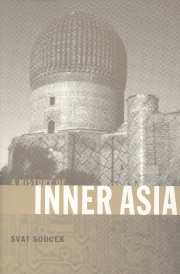Book contents
- Frontmatter
- Contents
- List of maps
- Preface
- Introduction
- 1 The beginnings
- 2 The Kök Turks, the Chinese expansion, and the Arab conquest
- 3 The Samanids
- 4 The Uighur kingdom of Qocho
- 5 The Qarakhanids
- 6 Seljukids and Ghaznavids
- 7 The conquering Mongols
- 8 The Chaghatayids
- 9 Timur and the Timurids
- 10 The last Timurids and the first Uzbeks
- 11 The Shaybanids
- 12 The rise of Russia, the fall of the Golden Horde, and the resilient Chaghatayids
- 13 The Buddhist Mongols
- 14 Bukhara, Khiva, and Khoqand in the seventeenth to nineteenth centuries
- 15 The Russian conquest and rule of Central Asia
- 16 From Governorates-General to Union Republics
- 17 Soviet Central Asia
- 18 Central Asia becomes independent
- 19 Sinkiang as part of China
- 20 Independent Central Asian Republics
- 21 The Republic of Mongolia
- Summary and conclusion
- Appendix 1 Dynastic tables
- Appendix 2 Country data
- Select bibliography
- Index
5 - The Qarakhanids
Published online by Cambridge University Press: 05 June 2012
- Frontmatter
- Contents
- List of maps
- Preface
- Introduction
- 1 The beginnings
- 2 The Kök Turks, the Chinese expansion, and the Arab conquest
- 3 The Samanids
- 4 The Uighur kingdom of Qocho
- 5 The Qarakhanids
- 6 Seljukids and Ghaznavids
- 7 The conquering Mongols
- 8 The Chaghatayids
- 9 Timur and the Timurids
- 10 The last Timurids and the first Uzbeks
- 11 The Shaybanids
- 12 The rise of Russia, the fall of the Golden Horde, and the resilient Chaghatayids
- 13 The Buddhist Mongols
- 14 Bukhara, Khiva, and Khoqand in the seventeenth to nineteenth centuries
- 15 The Russian conquest and rule of Central Asia
- 16 From Governorates-General to Union Republics
- 17 Soviet Central Asia
- 18 Central Asia becomes independent
- 19 Sinkiang as part of China
- 20 Independent Central Asian Republics
- 21 The Republic of Mongolia
- Summary and conclusion
- Appendix 1 Dynastic tables
- Appendix 2 Country data
- Select bibliography
- Index
Summary
The turn of the millennium, as we have said, coincided in Central Asia with the collapse of the Samanids and their replacement by the Qarakhanids. To their contemporaries, this change was probably less revealing than to a historian pondering its impact. The Qarakhanids were by then Muslims like the Samanids, and the fervor of some khans seems to have surpassed that of their predecessors. Religion continued to be based on the Holy Book in Arabic, and the linguistic and cultural physiognomy of Samarkand, Bukhara, and other cities and towns as well as of the agricultural population of the countryside remained Iranian, though with an increasing shift from the Sogdian and Khwarazmian variants to Persian.
The Qarakhanids were Turks, however, and their arrival signaled a definitive shift from Iranian to Turkic predominance in Central Asia. The rule of the Turks over Transoxania was not unprecedented: we have seen that in its periods of strength, the steppe empire of the Kök Turks claimed suzerainty over the petty rulers of Central Asia. That relationship was, however, marginal and intermittent, for those Turks were nomads whose lifestyle and psychological orientation had remained immersed in the steppes of Inner Asia. The Islamization of their descendants or kinsmen changed this orientation. The Qarakhanids, who replaced the Samanids at the turn of the millennium, looked up to the caliph in Baghdad and the holy cities of Mecca and Medina as their ultimate spiritual authority, and Transoxania became part of their permanent home.
- Type
- Chapter
- Information
- A History of Inner Asia , pp. 83 - 92Publisher: Cambridge University PressPrint publication year: 2000



